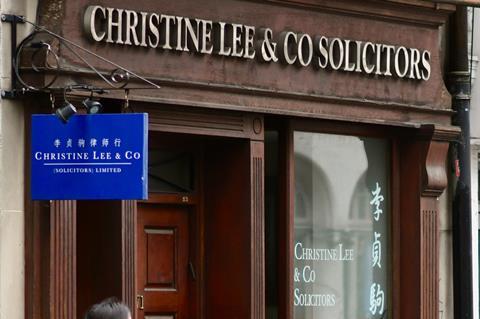A solicitor labelled ‘Chinese spy’ after MI5 named her as a threat to British democracy was not treated unfairly, a tribunal has ruled.
The Investigatory Powers Tribunal dismissed claims from Christine Lee and her son Daniel Wilkes after she was the subject of an Interference Alert issued by security services in 2022.
Lord Justice Singh, giving the lead judgment in Lee v Security Service, ruled that MI5 was entitled to issue the IA on public law grounds and in doing so had not breached the claimants’ human rights. He said the IA struck a ‘fair balance’ between Lee’s rights and those of the community given the risk to national security that she posed, and that the public interest outweighed the interference with her right to respect for a private life.
The tribunal heard that Lee, a solicitor since 2002 and founder of her own eponymous firm, had created and supported a number of community groups aimed at promoting political participation and fighting discrimination facing the British Chinese community.
She helped set up the All-Party Parliamentary Chinese in Britain Group, which was chaired by Labour MP Barry Gardiner. Her son volunteered in Gardiner’s office and was later employed from 2015 to 2020 in his parliamentary office.
In 2017, The Times published an article entitled ‘China cash link to Labour MP’ stating that Gardiner had received payments from Lee’s firm. There was no suggestion of impropriety and payments were properly declared.
Then, in 2022, the security services issued the IA to parliament’s security director to be disseminated to all MPs. This notice included Lee’s full name and her photo, and was intended to ‘draw attention to an individual knowingly engaged in political interference and activities’ for the Chinese Communist Party. It alleged that Lee had acted covertly in coordination with Chinese authorities and warned that MPs ‘should be mindful of her affiliation with the Chinese state’.

Wilkes subsequently resigned from Gardiner’s office and Lee was referred to in parliament as an ‘agent of the Chinese state’. She was called a ‘Chinese spy’ in multiple press reports. Her firm received racist and hateful emails which included rape and death threats.
Lee told the tribunal she was diagnosed with severe depression after the IA was issued and was shunned by the British Chinese community. Her bank withdrew her account and she changed her appearance and contact details for fear of being followed. Her firm suffered ‘irreparable reputational harm’ and dealt with online abuse and loss of work. It was investigated by the SRA, although no further action was taken.
Lee brought a claim on the basis that the IA was factually wrong, procedurally unfair and a breach of her human rights. She alleged she had been treated differently to people of a different nationality and suffered direct discrimination.
The tribunal said that questions of fact were generally for the decision-maker rather than the reviewing court, provided there was a rational basis for the IA. Furthermore, the IA was issued to protect parliamentary democracy by way of preventative action. The tribunal ruling added: ‘In that context, a decision-maker may well have to act on the basis of an assessment of risk. That is not necessarily the same as acting on the basis of facts which are capable of proof in the legal sense.’
The tribunal found it was not irrational for MI5 to act in the way it did (reasons for this were set out in a closed part of the judgment). There was also no right for Lee to have prior notice of the IA or the chance to make submissions before it was issued.
The security services had not subjected Lee to inhuman or degrading treatment in breach of her human rights. The decision was a ‘proportionate response’ to the threat posed by Lee and rationally connected to the objective of protecting parliament.
The tribunal also rejected the discrimination argument, saying that anyone who posed the same threat from a different race or nationality would have been treated the same. All the claims, including those of Wilkes, were dismissed.




























